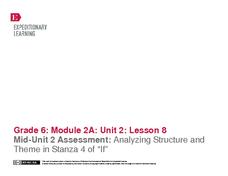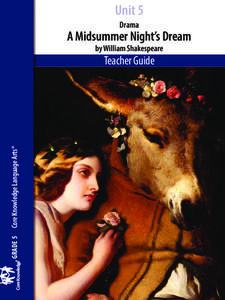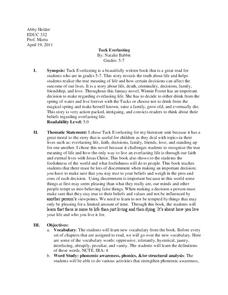Novelinks
The Tempest: List-Group-Label (After Reading)
Collaborate with your class after reading William Shakespeare's The Tempest with a group labeling activity. As you note key concepts or words from the play on the board, class members suggest associations and connections to each one, and...
National Endowment for the Humanities
The Strategy of Containment, 1947–1948
How do people stop the spread of an ideology they don't think is right? Scholars research the policy of containment during the start of the Cold War. Small groups analyze primary sources to determine how the United States combated...
Novelinks
The Tempest: QAR
Asking questions about a text is an effective way to improve reading comprehension. Apply the Question Answer Response strategy to your unit on William Shakespeare's The Tempest. As kids read each passage, they decide if the answer can...
Penguin Books
A Teacher's Guide to the Signet Classics Edition of Charles Dickens's Great Expectations
Instructors expect great things from a good teacher's guide, and this one delivers. The 48-page guide to Charles Dickens's Great Expectations provides information about plot developments and new characters and places introduced in each...
Curated OER
Twelfth Night: The K-W-H-L Strategy
Readers of Twelfth Night use a KWHL chart to record information about what they know about Shakespeare's play, what they want to find out, how they plan on finding this information, and what they have learned or still want to learn about...
Curated OER
Tangerine: K-W-H-L Strategy
As part of the introduction to Edward Bloor's Tangerine, class members generate a KWHL chart listing what they know, what they want find out, how they plan to find this information, and what they have learned or still want to learn.
Curated OER
The Tempest: The K-W-H-L Strategy
What does your class want to know about William Shakespeare's The Tempest? Host a discussion about the questions high schoolers have about the play with a KWHL activity in which they write down their inquiries, what they already know,...
EngageNY
Looking Closely at Stanza 1—Identifying Rules to Live By Communicated in “If”
Here is a lesson plan in which pupils connect themes and rules to live by from the story Bud, Not Buddy by Christopher Paul Curtis to those found in the poem If by Rudyard Kipling. First, scholars discuss their reading and review Bud's...
EngageNY
Analyzing Structure and Theme in Stanza 4 of “If”
Here is a lesson that provides scholars with two opportunities to stretch their compare-and-contrast muscles. First, learners compare and contrast their experience reading the fourth stanza of If by Rudyard Kipling to listening to the...
ReadWriteThink
"Three Stones Back": Using Informational Text to Enhance Understanding of Ball Don't Lie
"Three Stones Back," a passage from Matt de la Pena's best-seller, Ball Don't Lie, allows readers to practice their close reading skills as they compare the passage to an information text about wealth inequality.
Facing History and Ourselves
Social Media and Ferguson
How can social media help or hinder civil dialogue? How can information shared on social media be verified? As the investigation of media reports of the events surrounding the shooting of Michael Brown continues, class members read news...
Core Knowledge Foundation
Unit 6: The Reformation
Over three weeks, fifth graders read about and discuss the Reformation which saw religion and politics shift across Europe. Following daily readings, young scholars practice spelling, grammar, and morphology skills such as prefixes,...
Core Knowledge Foundation
Unit 5: A Midsummer Night’s Dream
Fifth graders analyze William Shakespeare's A Midsummer Night's Dream, paying close attention to character development, plot, and dialogue. With daily reading and thoughtful discussion, scholars take pen to paper to respond to journal...
Curated OER
Running Out of Time: Vocabulary Strategies
Review concepts and terms after reading Running Out of Time. Learners each come up with a few terms that they think are important and then participate in a list-group-label exercise, paying close attention to the two main years featured...
Curated OER
Hiroshima: Question Answer Response Strategy (QAR)
“The crux of the matter is whether total war in its present form is justifiable. . .” After reading “The Aftermath,” the final chapter of Hiroshima, class members use a Question Answer Response (QAR) strategy to reflect on issues raised...
K20 LEARN
The New Colossus: Determining Author's Perspective
Introduce young scholars to the concept of the author's perspective with a lesson that uses Emma Lazarus's poem, "The New Colossus," as the anchor text. Groups use a T-chart to identify words that reveal the author's point of view of The...
Fluence Learning
Writing an Opinion: Student Council
A three-part assessment challenges scholars to write opinion essays covering the topic of the student council. After reading three passages, writers complete a chart, work with peers to complete a mini-research project, answer...
EngageNY
Introducing Research Folders and Generating a Research Question
Take the next step in the writing process with a lesson plan geared towards the completion of writing an evidence-based essay about a rule to live by, as Bud did in Bud, Not Buddy by Christopher Paul Curtis. Pupils collaborate with their...
Bantam Books
The Tempest: Think-Aloud Annotation
It can be difficult to refer back to a text when analyzing it, so annotation is a great tool for kids to track what they are reading. A thorough and well-organized lesson guides learners through the process of annotating William...
Academy of American Poets
Teach This Poem: "November 2: Día De Los Muertos" By Alberto Ríos
Scholars examine a colorful and detailed picture, then view an engaging video in preparation for reading the poem "November 2: Día De Los Muertos" by Alberto Ríos. Learners discuss their observations, feelings conveyed, and the...
Digital Public Library of America
A Raisin in the Sun by Lorraine Hansberry
A set of 14 primary sources provides background for a study of Lorraine Hansberry's drama, A Raisin in the Sun. Featured are images from stage productions of the play, white supremacy protests, a clip from a television interview, and...
Curated OER
Learning About Prediction
The skill of prediction as a reading strategy is explored. Learners are shown how to use clues within a story, along with pictures, to make predictions as to what's going to happen in the story. A clever in-class game which uses objects...
Novelinks
The Winter’s Tale: Facebook Strategy
To demonstrate their understanding of characterization in The Winter's Tale, groups create a Facebook profile for one of the characters in Shakespeare's play.
Curated OER
Tuck Everlasting
Clearly written as an assignment for a higher-level education class, this formal lesson plan contains some fun and well-researched strategies for teaching the novel Tuck Everlasting by Natalie Babbitt. Among the best ideas included in...

























